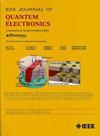Birefringence Free Spectral Tuning of Bragg Grating Based Fabry-Pérot Resonator in LiNbO₃ Waveguide Employing Counter- Propagating Cladding Modes
IF 2.2
3区 工程技术
Q3 ENGINEERING, ELECTRICAL & ELECTRONIC
引用次数: 0
Abstract
We propose and analyse a novel, birefringence free, wavelength filter based on counter-propagating cladding mode assisted integrated-optic Fabry-Pérot (FP) resonator. The FP cavity is formed by suitably designed counter-propagating cladding-mode exciting Bragg gratings in LiNbO3 ridge waveguide. Through rigorous vectorial modeling, we show that appropriate waveguide dimensions and crystal orientation enable birefringence-free operation for both the fundamental core mode as well as the excited cladding mode. We also show that the zero birefringence point of the filter remains unchanged regardless of the applied voltage across the crystal; the reasons behind this behaviour are also explained by the linear electro-optic effect of LiNbO3. Using this we demonstrate a linear electro-optic tuning of the individual Bragg grating spectrum as well as the FP resonances with a typical tuning coefficient of 4 pm/V. Our results may find application in designing high-speed tunable wavelength filters free from input polarization state with linear spectral tuning capabilities.铌酸锂波导中基于布拉格光栅的法布里-佩罗共振器的无双折射光谱调谐,采用反传播包层模式
我们提出并分析了一种新型无双折射波长滤波器,它基于反向传播包层模式辅助集成光学法布里-佩罗(FP)谐振器。FP 腔体是由铌酸锂脊波导中适当设计的反传播包层模式激励布拉格光栅形成的。通过严格的矢量建模,我们证明了适当的波导尺寸和晶体取向可实现基本核心模式和激发包层模式的无双折射运行。我们还证明,无论在晶体上施加何种电压,滤波器的零双折射点都保持不变;氧化铌锂的线性电光效应也能解释这种行为背后的原因。通过这种方法,我们展示了对单个布拉格光栅光谱以及 FP 共振的线性电光调谐,典型调谐系数为 4 pm/V。我们的研究成果可用于设计具有线性光谱调谐能力的高速可调谐波长滤波器,而不受输入偏振状态的影响。
本文章由计算机程序翻译,如有差异,请以英文原文为准。
求助全文
约1分钟内获得全文
求助全文
来源期刊

IEEE Journal of Quantum Electronics
工程技术-工程:电子与电气
CiteScore
4.70
自引率
4.00%
发文量
99
审稿时长
3.0 months
期刊介绍:
The IEEE Journal of Quantum Electronics is dedicated to the publication of manuscripts reporting novel experimental or theoretical results in the broad field of the science and technology of quantum electronics. The Journal comprises original contributions, both regular papers and letters, describing significant advances in the understanding of quantum electronics phenomena or the demonstration of new devices, systems, or applications. Manuscripts reporting new developments in systems and applications must emphasize quantum electronics principles or devices. The scope of JQE encompasses the generation, propagation, detection, and application of coherent electromagnetic radiation having wavelengths below one millimeter (i.e., in the submillimeter, infrared, visible, ultraviolet, etc., regions). Whether the focus of a manuscript is a quantum-electronic device or phenomenon, the critical factor in the editorial review of a manuscript is the potential impact of the results presented on continuing research in the field or on advancing the technological base of quantum electronics.
 求助内容:
求助内容: 应助结果提醒方式:
应助结果提醒方式:


